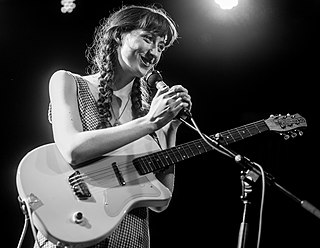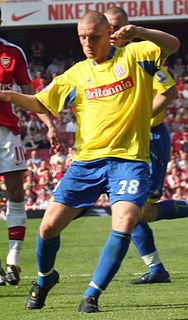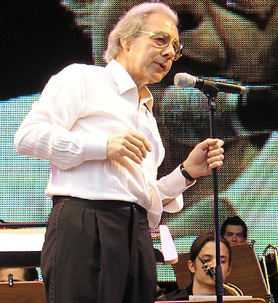A Quote by Amy Hempel
I started writing by doing small related things but not the thing itself, circling it and getting closer. I had no idea how to write fiction. So I did journalism because there were rules I could learn. You can teach someone to write a news story. They might not write a great one, but you can teach that pretty easily.
Related Quotes
My cure for writer's block is to step away from the thing I'm stuck on, usually a novel, and write something totally different. Besides fiction, I write poetry, screenplays, essays and journalism. It's usually not the writing itself that I'm stuck on, but thing I'm trying to write. So I often have four or five things going at once.
It's good for people to be able to see an archive of an artist learning how to write and getting better, especially for teenagers who are starting to write: to see that I started out making pretty easy and weird and bad-sounding music and that you can teach yourself how to write over a long period of time.
I say to my students that I can't teach them how to write a good song, but I can teach you how to write a better song. Talking about this idea of it being a process. By going back and not settling for something and find a way to step back from your songs-which is a very hard thing to do-but when you're stuck or you can't move forward, start doing some polishing.
I've always been a writer. I started getting paid for writing in college. Where it transitioned from commentary to journalism was in that shift - not wanting to write personal stories because people are hungry in not necessarily great ways for the sexy, sexy, sex work story. I was trying to shift the focus, and journalism was the tool I needed to write about people outside my own life and range of experience.
I fundamentally believe that no one can teach you how to write - finding out how to write a story is part of the process of creating a story - but you can really learn through exposure to different writing, to different art forms, to different modes of storytelling, and with mentors who are able to get you to step outside your comfort zone.
I've been making a list of the things they don't teach you at school. They don't teach you how to love somebody. They don't teach you how to be famous. They don't teach you how to be rich or how to be poor. They don't teach you how to walk away from someone you don't love any longer. They don't teach you how to know what's going on in someone else's mind. They don't teach you what to say to someone who's dying. They don't teach you anything worth knowing.
It used to be that you would go into a writing program and what you would learn was how to write a short story. You would pick up the magazines and you would be taught from the magazines how to write a short story. Nowadays student writers are learning to write novels because that market is gone, so the ones who are drawn to the form are doing it really for reasons of their own and that's really exciting.
This fear is one of the horrors of an author's life. Where does work come from? What chance, what small episode will start the chain of creation? I once wrote a story about a writer who could not write anymore, and my friend Tennessee Williams said, 'How could you dare write that story, it's the most frightening work I have ever read.' I was pretty well sunk while I was writing it.
You cannot teach somebody to write a masterpiece, but you can certainly teach them how to improve their writing skills. And you can teach them that they can make their own voices more effective by being able to communicate more clearly and forcefully. It makes people feel more capable when they can write - for instance to make a request - of a politician - and when they are able to receive a reply.
I write because I have an innate need to. I write because I can't do normal work. I write because I want to read books like the ones I write. I write because I am angry at everyone. I write because I love sitting in a room all day writing. I write because I can partake of real life only by changing it.
I started out as a poet who primarily wanted to write about image and moment. Over the years I've been trying to teach myself how to do plot and scene. My first story collection had the most issues with the plotlessness, and when I was writing my second collection I was teaching myself how to make things happen.
I started out in graduate school to be a fiction writer. I thought I wanted to write short stories. I started writing poems at that point only because a friend of mine dared me to write a poem. And I took the dare because I was convinced that I couldn't write a good poem... And then it actually wasn't so bad.
I was very young, maybe five. The opera was very... I was attracted to opera to the point that I think it's the reason I started to write music for films. I never studied. There are film and music school that teach you how to write music. I never studied that. But the influence of opera, which is a combination of storyline, visuals, staging, plus music... that was perhaps the best school I could have had. That's what gave me the idea of coming to Hollywood to write music for films.






































